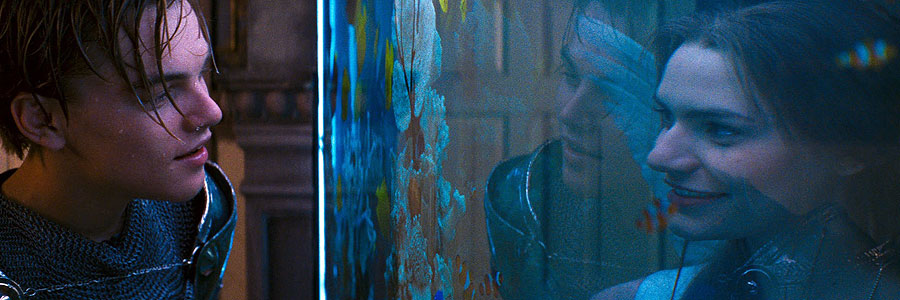
William Shakespeare’s Romeo And Juliet
20th Century Fox
Original release: November 1ST, 1996
Running time: 120 minutes
Director: Baz Lurhmann
Writers: Baz Lurhmann, William Shakespeare, Craig Pearce
Composer: Nellee Hooper
Cast: Leonardo DiCaprio, Claire Danes, Paul Rudd, John Leguizamo
The Capulet Party: 00:25:00 to 00:32:10
Deconstructing Cinema: One Scene At A Time, the complete series so far
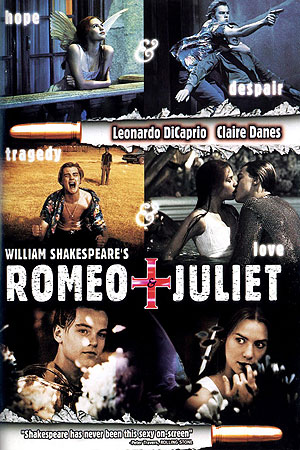
Love at first sight. If you believe in it, then Romeo And Juliet is filled with wonder, possibility and deep tragedy. If you fail to see how catching the eyes of someone across the room can lead to a piercing dagger right through your heart, then neither Shakespeare nor director Baz Lurhmann are going to make you feel otherwise. To those of us lucky enough to be have once been struck by Cupid’s arrow, Baz Lurhmann’s contemporary adaptation of Shakespeare’s most famous play captures the giddy initial impact of love at first sight and then brilliantly and tragically sets us up for the fall to come in the space of a single scene.
Once Romeo Montague (Leonardo DiCaprio) arrives at his family’s sworn enemies the Capulet’s fancy dress party, his fate is sealed from the moment he first lays eyes on the beautiful Juliet Capulet. The stunning mansion setting, the use of Shakespeare’s archaic language and the music, editing and flamboyant costumes all add up to create a swirling, swift and sensual scene that stuns the viewer. Lurhmann perfectly captures the short lived romance, the excitement and the impending doom all in seven minutes. From when their eyes first meet to their realization of who they are and why their love is doomed, it is the critical point in the narrative and the tragic outcome becomes suddenly inevitable. But before the gloom,
At the costume party, Romeo and his mischievous buddies have entered in disguise, popped some pills and danced under the noses of their enemies. Romeo has discarded his mask, submerged himself in water and is now coming down off the initial rush of the party and the drugs he has ingested. Juliet has refused to wear a mask and when their eyes first meet through a giant aquarium in a quieter room off the main ballroom, they’re both in costume but without facial coverings. The use of water at romantic moments in the film runs through the later pool scene and even extends to the lack of water in Romeo’s desert exile scenes. The water suggests connectivity, being fluid and soft.
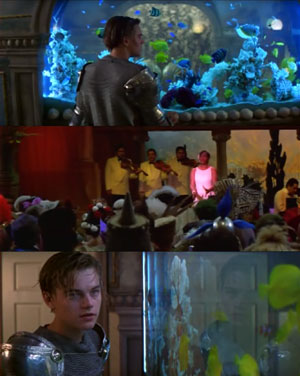
Romeo is captivated by the fish and the coral and Juliet emerges as an apparition in white, her eye only at first visible but then her face and upper body also come into view. The glass splits them, keeping them apart but allowing them to look into each other’s faces, blinking and love struck. Their families will consistently try to split them and pull them apart from this scene onwards. Their reflections are etched on each other’s faces, suggesting a connection and closeness no obstacle can overcome.
To the sound of Des-ree’s achingly romantic Kissing You, the couple stare in wonder at each other through the water until Juliet is dragged away to dance with her fiancé Paris (Paul Rudd). Both having been alone and separated by the glass but connected through the divide, Juliet is now thrust back out into the more raucous ballroom. As Romeo emerges to look at her from afar, he is framed by red on the walls and on a large decoration behind him. Love, romance and danger intertwine, only added to by the costumes of all the major players.
Tybalt (John Leguizamo), Juliet’s cousin is dressed as a devil and flanked by his comrades in skeleton costumes. Everything about them reeks of danger and death, Tybalt even having bright red horns suggesting his passionate rage is bursting out of his demon’s head. The fire in him is further fuelled when his Uncle, Juliet’s father, slaps him for trying to fight with Romeo. Juliet’s father is dressed in flashy colours and glittery make up, drawing attention to himself and his excess but also showing his power in a Julius Caeser style costume.
As the music builds, Romeo’s sight of the now dancing Juliet and Paris is obscured by a pillar. Juliet is dressed as an angel, pure and innocent all in white and with wings attached to her back. Paris is an astronaut, clearly deluded and oblivious to the subject of Juliet’s attention and affection. While Paris dances and laughs, Juliet steals glances at Romeo, partially hidden behind the pillar. Romeo is dressed as a knight in shining armour, a prince ready to fight for and defend her. Juliet is embarrassed, caught in the middle of two suitors, one who is dancing and smiling at her and one who watches from afar, smiling and catching her gaze.
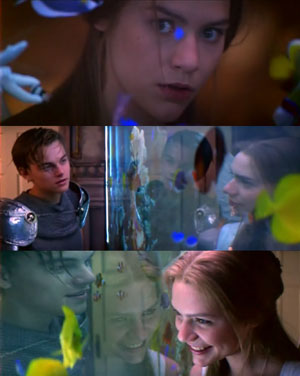
Romeo and Juliet seem apart from their fellow party-goers. Their costumes are more traditional and classic as opposed to the more lewd offerings of others. An angel and a knight contrast with the more futuristic costume of Paris in his astronaut outfit. Romeo is symbol of rescue but instead of being dressed as a princess, Juliet is an angel, suggesting her early tragic death. Her angel costume connects her with the spiritual, whereas Paris may go into the sky as an astronaut but must always return to Earth. The star crossed lovers are stuck in the past, immortally young as opposed to Paris’ perfect bachelor who will go on to explore new frontiers.
Editing adds to the tension with shots of Juliet’s approaching mother and the action with Tybalt and his furious Uncle causing the audience to fear for how long Romeo and Juliet’s love can go on unnoticed. Kissing You fades from the soundtrack without the young lovers having enacted its lyrics yet but as the revelers applaud Des-ree’s performance Romeo finally makes his move, stealing Juliet’s hand and pulling her away from her fiancé Paris. Lady Capulet, Juliet’s nurse and Paris are all oblivious to the invisible string that binds Romeo and Juliet from the first moment they met. Only the audience knows the connection through the editing that constantly links their glances to each other.
When Romeo and Juliet first speak to each other it’s of pilgrims and saints and further reveals them as out of time and touch with the decadent revelers of this party. For so long they have been kept apart and they finally come together in an elevator bringing them a moment of peace away from the party. At last they kiss, encaged but with society shut out. They’re trapped and free at once and as they move between levels of the mansion, they are free to break social barriers and restrictions but only for a limited time. The doors will always open and reality and society will always be outside, ready to disapprove.
The cutting quickens and the camera swirls faster as the music builds to a string crescendo, both exciting and laden with doom at the same time. The couple kiss quickly but constantly interrupted by the opening and closing of the elevator doors. Their faces, hands, bodies and lips appear fully connected and cocooned in their own little world. The Capulet family crest on the doors of the elevator splits in two every time the doors open, representing the desires of Romeo and Juliet to break free of their families’ hatred.
The nurse finally manages to pull Juliet out of the lift and Romeo is forced to eagerly follow. Juliet is dragged through the crowd and up the stairs. Compared with the freedom of movement the elevator afforded the pair, the stairs is rigid and set in stone. Romeo is stuck at the bottom and Juliet is trapped at the top, framed in a family unit. Juliet looks down on Romeo and him up at her, emphasized by the camera angles. They finally realize who they are and the implications of their love at first sight.
Love can be dangerous and love can be hard but you can’t choose who you fall in love with. Just because society may shun you for it and people may try to keep you apart, does not mean you just let it go because when love strikes, at its best/worst, it’s worth fighting and perhaps even killing for. The star crossed lovers of Romeo And Juliet never stood a chance but in this mesmerizing and beautifully constructed scene, we see just exactly how easy it is to become struck by love and even worse, just how quickly hate can tear us apart.
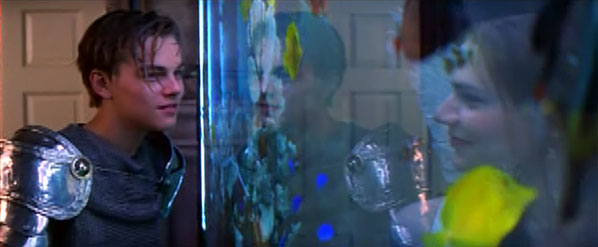

Pete Turner
Peter is a film and media lecturer and currently writing his PhD thesis on found footage horror movies. This means he must endure all sorts of cinema’s worst drivel in the name of academia. If that wasn’t punishing enough, Peter enjoys watching films with brutal violence, depressing themes and a healthy splash of tragedy.
If Peter isn’t watching films, he is writing about them, talking about them or daydreaming about them. He regularly contributes to Media Magazine and a range of film websites. You can find his film blog at www.ilovethatfilm.blogspot.com and follow him on Twitter @ilovethatfilm.
© 2022 STATIC MASS EMPORIUM . All Rights Reserved. Powered by METATEMPUS | creative.timeless.personal. | DISCLAIMER, TERMS & CONDITIONS
HOME | ABOUT | CONTACT | TWITTER | GOOGLE+ | FACEBOOK | TUMBLR | YOUTUBE | RSS FEED
CINEMA REVIEWS | BLU-RAY & DVD | THE EMPORIUM | DOCUMENTARIES | WORLD CINEMA | CULT MOVIES | INDIAN CINEMA | EARLY CINEMA
MOVIE CLASSICS | DECONSTRUCTING CINEMA | SOUNDTRACKS | INTERVIEWS | THE DIRECTOR’S CHAIR | JAPANESE CINEMA





